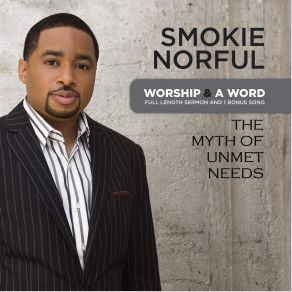Worship and a Word: The Myth of Unmet Needs
Download links and information about Worship and a Word: The Myth of Unmet Needs by Smokie Norful. This album was released in 2010 and it belongs to Gospel genres. It contains 7 tracks with total duration of 46:11 minutes.

|
|
|---|---|
| Artist: | Smokie Norful |
| Release date: | 2010 |
| Genre: | Gospel |
| Tracks: | 7 |
| Duration: | 46:11 |
| Buy it NOW at: | |
| Buy on iTunes $4.99 | |
| Buy on Amazon $4.99 | |
Tracks
[Edit]| No. | Title | Length |
|---|---|---|
| 1. | Chapter 1: Where Your Treasure Is, Your Heart Will Be | 6:41 |
| 2. | Chapter 2: God Is My Source | 7:47 |
| 3. | Chapter 3: Goodness and Mercy | 7:13 |
| 4. | Chapter 4: Every Need I Have Has Already Been Met | 9:05 |
| 5. | Chapter 5: God Is My Manager | 7:07 |
| 6. | Chapter 6: If You Trust Him, He Will Bless You | 4:06 |
| 7. | God Is Able | 4:12 |
Details
[Edit]Gospel singer and Baptist minister Smokie Norful's Worship & a Word series of CDs ($5.98 list) combines a full-length sermon with one song reflective of the sermon's theme. In The Myth of Unmet Needs, he treats financial issues, and he seems aware that he is addressing a congregation that, in the uncertain economic circumstances of 2010, may be having some trouble making ends meet. "I know this ain't the ‘shout your mama' sermon," he acknowledges at one point. It is, however, a sermon based on a series of Biblical passages assuring the faithful that God will meet — indeed, as Norful interprets it, has already met — their needs, starting with Matthew 6:25-34. The point is always that, instead of worrying about mortgage payments and credit card debt, churchgoers should be focusing on spirituality, after which things will take care of themselves. "You may say, ‘I am broke,' and it might be a fact," Norful notes, "but it's not the truth." It's not, that is, the Truth with a capital "T." "Your situation says, ‘I am broke,'" he adds, "but your God says, ‘I am wealthy in Christ Jesus.'" One must look, he explains, not with one's "carnal mind," but instead with one's "spiritual eyes." Norful uses personal anecdotes to make general points, whether he is speaking proudly of his highly accessorized car or referring back to his poor grandmother and her 14 children. He can be stern, reminding his listeners that God didn't get them into debt, that they did it themselves. But his main point is to ease his listeners' minds. "Am I helping anybody?," he asks several times, and the murmurs of assent suggest he is. After 40 minutes, he sings the song "God Is Able," reinforcing his point about the beneficent and potentially lucrative potential of Christian faith.